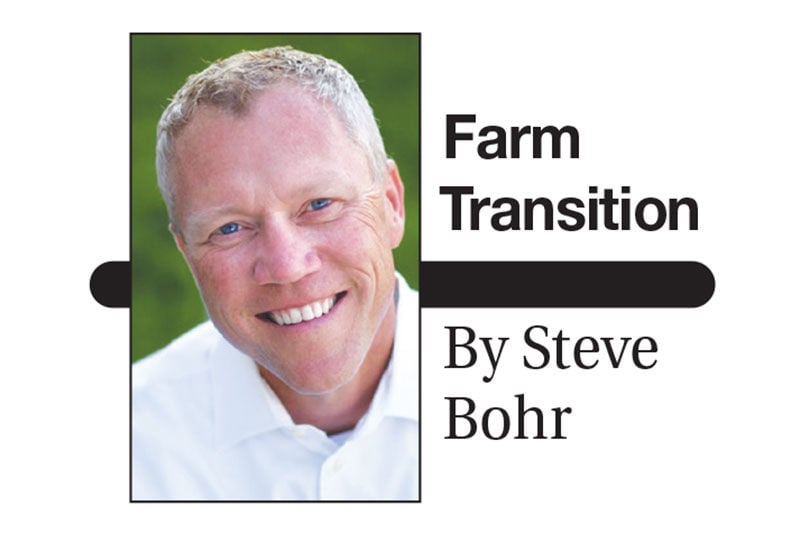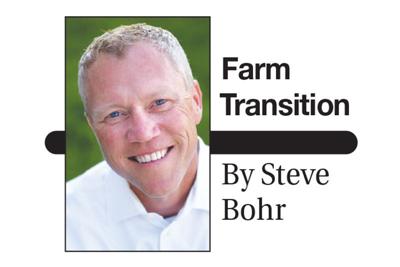Sometimes I do my best thinking in church. Our priest likely would frown upon my mind wandering during his homily, but oftentimes the message correlates with a farm transition concept.
I read an email this morning before I went to church, so it happened to be on my mind and as luck would have it, the homily was fittingly about ŌĆ£being prepared.ŌĆØ
The email was a farm family trying to prepare for the future of their land ownership, knowing there might be future adversity with differences in opinions along the way. This represents the transition struggle a lifetime of work and legacy left behind.
The question
ŌĆ£My husband and I have an ongoing disagreement on how to value our family farm in our estate plan amongst our children.
ŌĆ£He believes that there should be a reduced value if any of our children want to sell the land, and he believes that our son should be able to buy it at a ŌĆśdiscountedŌĆÖ value. I personally believe that any buyout amongst our children should be at appraisal price so that their inheritance is equal and not weighted towards the one who buys the land and against the ones who are selling it.
ŌĆ£Could you give us both sides of this discussion to help us find some middle ground within our family? I assume you have seen other families in this same predicament.ŌĆØ
ŌĆśReared with purposeŌĆÖ
Multiple times during mass I became emotional as the family in the pew in front of me proved symbolic of my own family and the legacy our parents have left behind.
The young couple had four daughters under the age of about 8. These sisters matched in age as close as I could tell to my own older sisters. It was like seeing old photos of my sisters and parents brought to life.
The oldest was motherly and seemingly compliant, but I could tell that she may not always be as amenable as she seemed.
The second oldest was a leader and inquisitive but was the ultimate team player.
The third daughter did her own thing, but you could tell she looked up to her two older sistersŌĆÖ bond and wanted to be in the ŌĆ£big girl club.ŌĆØ
The youngest was the energy of the group. She was definitely not shy and very smart. She knew how to get a snack out of her dad even under the watchful eye of her mother.
I teared up wondering if in the late ŌĆÖ60s there was an individual like me sitting behind my mom and dad with my four sisters in a church pew with fond memories of his own family and how grateful he was to be raised in a that setting.
There may be no clear correlation to some, but others may be able to relate to the question about how to value farmland in a family transition.
Mom and Dad reared us with purpose. The three most important things to us were ŌĆ£Faith, Family and Farming.ŌĆØ We learned to be God-fearing Christians. We treated as we would want to be treated.
People are also reading…
More directly to the subject matter, Dad drilled in us to be stewards of the land ŌĆö ŌĆ£Take care of the land and it will take care of you.ŌĆØ We did not so much ŌĆ£ownŌĆØ the land, like an investment to be sold for profit, as we were temporary caretakers of the land who happened to steward between those who came before us and those who will take care of it after us.
In the ŌĆÖ70s we learned when opportunity arose, you acquired land even if the older generation quipped that ŌĆ£you will never live long enough or work hard enough to pay for it.ŌĆØ
My dad and uncle cared for the land by investing in its upkeep with tile and terraces. They took advantage of incentive programs and cost-shared conservation practices even though they had to borrow the means to pay for it.
In the ŌĆÖ80s, we learned that life is hard and you had to sacrifice to keep a way of life that was important to the family. We learned to pay off the mortgage, even if it meant going without while borrowing money on the crops, livestock or equipment.
Not once was it an option to look for an opportunity to sell the land for a profit and move that money into an alternative investment.
We learned that just because something seemed easy did not mean that it was right. There was never a wrong time to do the right thing and never the right time to do the wrong thing.
It was possible to have a wrong time to buy land, but there would never be a right time to sell land.
My answer
With that backdrop, my advice is for you and your husband to answer the question, ŌĆ£Which marketplace do you want your land to be valued in to determine the inherited value of your family land?ŌĆØ
If you consider your land as an investment to buy low and sell high on the open market (like a commodity) then an open-market appraisal approach is the method you should use to price your family land in your transition plan.
You could incorporate a process to take into consideration the lack of marketability of a shared asset (if owned by more than one person), but in this situation, you would use the open marketplace using auction prices of non-related party transactions.
If you believe that the land is an opportunity to make a living to provide for your family, as well as others in the community, then pricing the land in the open marketplace would not be appropriate.
The situational value of land not going to sale in the open market is different for a family who desires to continue ownership and provide an opportunity to make a living on the land and continue legacy ownership.
This is more of a ŌĆ£cash-flowŌĆØ value of the land. Finding this value (or a process to set this value) can be difficult as there are moving parts. This warrants effort if this is what you believe.
There is no ŌĆ£rightŌĆØ or ŌĆ£wrongŌĆØ answer unless you give no answer at all and leave it to chance for your children to fight over what they believe you would have wanted. Ultimately, you need to decide if the ŌĆ£familyŌĆØ value of the inheritance of your land will be placed on selling it (realized value) or keeping it (unrealized value).
Often the communication breakdown is due to uncertainty and a lack of options, followed by confusion and potential greed in the marketplace (fueled by temporary satisfaction of the short-term gain at the expense of long-term stability).
My sincere hope is that you will be able come to terms with your own personal (possibly different) views on farm transition and find the plan that is not only right for you, but also right for your entire family.
For 33 years, Steve Bohr has been a partner in the farm continuation firm of Farm Financial Strategies, Inc. For additional information on farm continuation issues or if you have a question please contact Steve via email at Bohr@FarmEstate.com or by phone at 1-800-375-4180.







